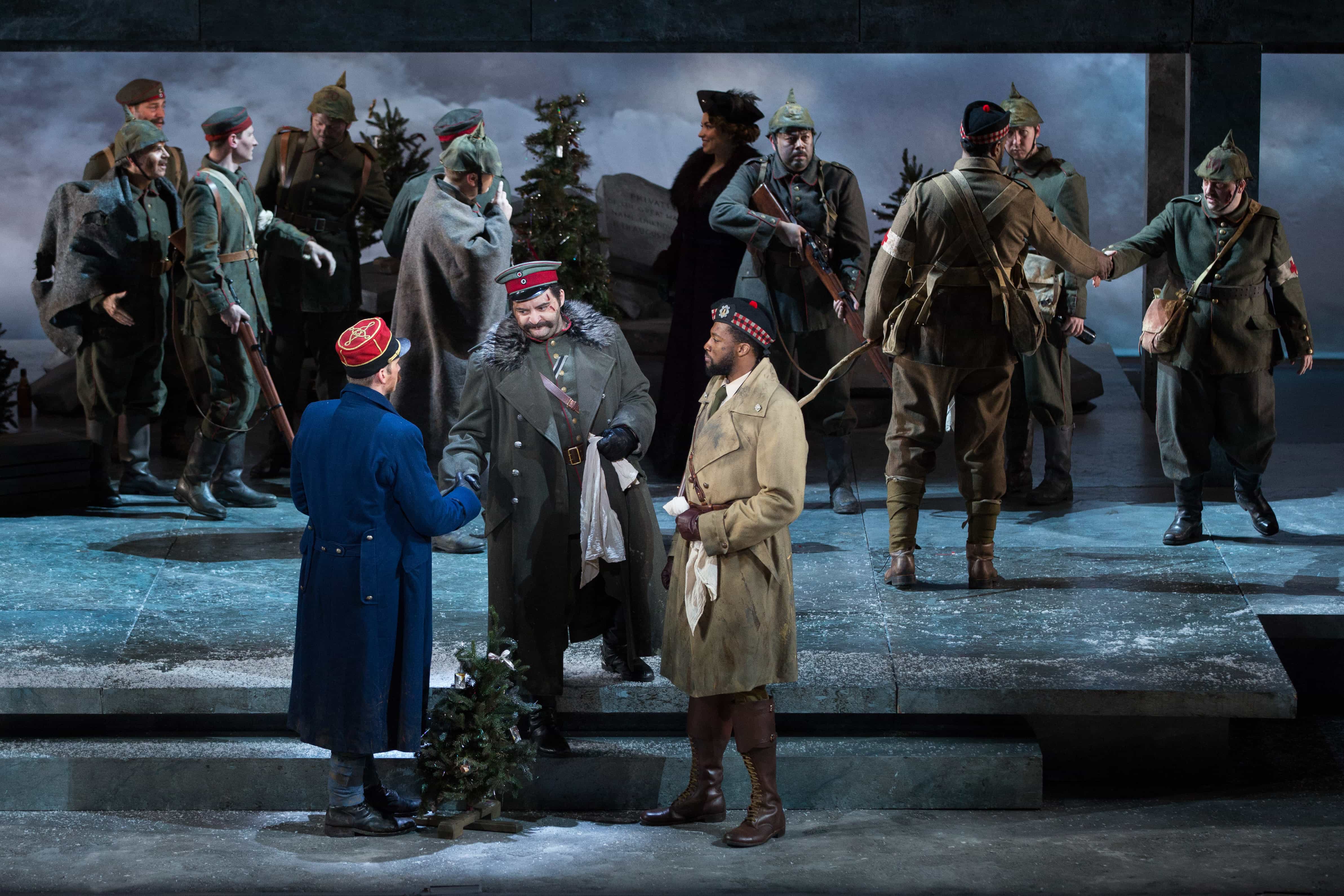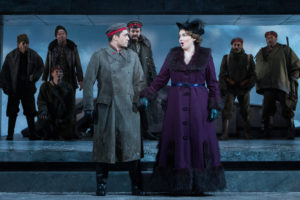The Washington National Opera’s current production of the opera Silent Night is a shattering indictment of the futility and waste of war set during the historical truce that occurred during World War I on Christmas Eve December 24, 1914, between the Scottish, French, and German units.

This very intimate opera deservedly won the Pulitzer Prize for Composer Kevin Puts’ distinctive music. Puts’ music is totally absorbing whether being conducted (superior conducting by Nicole Paiement) with appropriate intensity or delicacy. Puts’ music envelops the ruminative and poetic Libretto by Mark Campbell without overtly dominating the finely-wrought book. All elements of the opera work as an organic whole.
Librettist Mark Campbell has three storylines intersect and these familial and romantic situations made the opera very relatable to the audience so that it would be easy to identify the everyday realities that continue during the dissonance of war.
This is a very specialized opera in the best sense of the word and it is perfectly presented in the Kennedy Center’s Eisenhower Theater. This venue lends the special ambience and atmosphere that the opera demands. Yes, universal truths about the futility and hazards of war abound but this opera understands that the very human minutiae of subverting daily life is one of the follies of war. This innovative opera only occasionally delivers full-blown arias except for a few lovely moments from some of the leading players, especially Soprano Raquel Gonzalez who sings like a dream.
Director Tomer Zvulun accentuates the disarming reciprocity and acts of human decency that even supposed enemies can have for each other whether sharing the celebration of the Mass, singing Christmas Carols together, or sharing alcohol.
Director Zvulun was especially adept at portraying the anger and the accusations of treason by military commanders because the fighting men had fraternized with the enemy.
The huge ensemble of singers assembled here are primarily members of the Domingo -Cafritz Young Artist Program and they are showcased with finesse. The Washington National Opera Chorus ably sang throughout.
The German and French languages and the Scottish dialect predominate in the moving ensemble passages and the underlapping and overlapping harmonies are mesmerizing and transcendent.
Soprano Raquel Gonzalez’ aria on the dread every woman feels upon hearing a knock on the door during wartime was a high point of the production.

Tenor Alexander McKissick was a knockout as Nikolaus Sprink. Mr. McKissick’s duets with Ms. Gonzalez were enthralling.
Baritone Michael Adams commanded the stage with ease and authority as the French Lieutenant Audebert. Mr. Adams’ rich baritone flowed beautifully as he sang of his grief over the death of his friend Ponchel.
Baritone Christian Bowers as Ponchel delivered a natural and very human performance.
Bass Timothy J. Bruno shone as the French General.
Tenor Patrick Cook as Kronprinz projected an air of bemusement and authority that was ribald in spirit and demeanor.
Baritone Joshua Conyers sang with authority and panache as the British Major.
An interesting aspect of this opera was the fact that this production was the premiere of a new orchestration by composer Jacques Desjardins which was a co-commission of Washington National Opera and Opera Parallele.
The beautiful Prayer of St. Francis and many Latin passages and the celebration of the Mass all aided in the spiritual nature of this opera.
Set and Projection Design by Erhard Rom was a marvel of ingenious design. Three distinct levels or partitions showed the three military groups in vertical alignment. The use of a screen to highlight differing scenes in the opera was extremely effective. Visuals effects of smoke from fighting and snow falling were very effectively incorporated. A visual projection of rivers of blood falling was a disturbing and effective image.
Lighting Design by Robert Wierzel was very evocative and Costumes by Victoria Tzykun were sartorially apt.
The Washington National Opera should be commended for presenting this challenging and historical opera.
Running Time: Two Hours with a 25-minute intermission
Silent Night plays through November 25th, 2018, at the Kennedy Center’s Eisenhower Theater – 2700 F Street, NW, in Washington, DC. For tickets go online.




